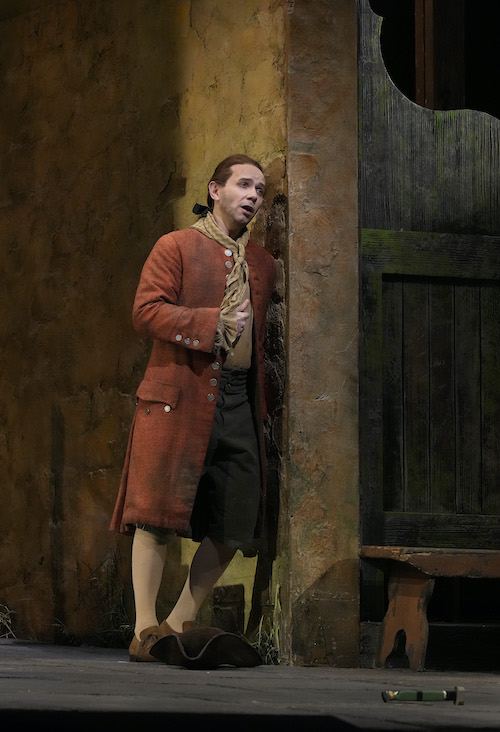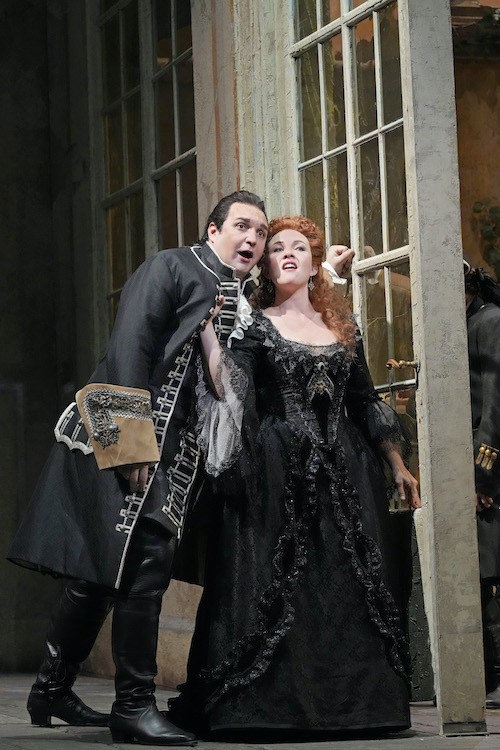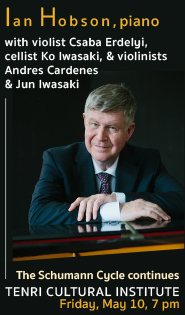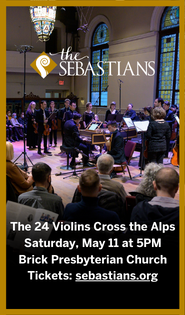Met serves up a first-rate night of Handel in “Rodelinda”

Harry Bicket’s regular visits to New York with a Handel opera in tow are always high points of the classical music season. One of the last things the Metropolitan Opera put on stage before the pandemic was Agrippina, with Bicket conducting, and Friday night he was back in the pit for a revival of Rodelinda.
Handel wrote over forty operas, only a fraction of which are commonly staged, making this revival something of a new experience. This Stephen Wadsworth production premiered in 2004 and has returned for two previous seasons, yet this was still only the 23rd performance of Rodelinda in Met history.
That fact, Bicket’s charms in Handel, and a starry cast of soprano Elza van den Heever, tenor Paul Appleby, countertenors Iestyn Davies and Anthony Roth Costanzo, mezzo-soprano Sasha Cooke, and bass-baritone Adam Plachetka alone make this Rodelinda worthwhile.
Performances were first-rate all around, on stage and in the pit, and there were several superlative stretches. That, and the strong production, were essential to the evening, because Rodelinda is not in the first rank of Handel’s operas.
The title character, sung by van den Heever, is the wife of Bertarido (Davies), recently deposed king of Lombardy and Milan. Grimoaldo (Appleby) has attacked and taken control of Milan, partnered with Bertarido’s brother Gundeberto—who has died before the opera begins. The whole scenario begins in media res, which is one of Rodelinda’s flaws.
Plot is an issue as well. There’s a lot of it—Bertarido is faking his death, while Grimoaldo is in love with the former king’s sister-in-law, Eduige (Cooke) while plotting to marry Rodelinda, while he’s also being undermined by his lieutenant Garibaldo (Plachetka) and an ally of Bertirado, Unulfo (Costanzo). Further, the balance between arias, recitatives and ensembles is off. There’s not enough development to make the plot work and so not all of the latter feel like dramatically sensible moments, despite their musical pleasures.
But this is Handel, so there are still many fantastic arias that had one almost believing in the opera. Those began early, almost immediately after the curtain, with Rodelinda’s “Ho perduto il caro sposo.” Van den Heever has a beautiful sound, darkly colored but not heavy. Even more beautiful were her phrasing and expression. Her manner was slightly understated for the most part in this and her other showpieces, singing with a long and well-crafted legato line, then hitting deep points of musical and emotional expression with strength.
Davies sings this same role on a 2021 recording of the opera with Bicket and the English Concert, and Friday night he was just as superb. He sounded fuller and richer than one has heard, and the music may be ideal for him. In “Dove sei,” he let his sound and color grow and develop in an organic way, not just a crescendo but a modulation of quality. His was the most emotionally palpable singing of the night, and throughout the performance, his characterization was so expressive and natural that he disappeared into the part. In a night when all the music-making was excellent, he and Bicket seemed to share an effortless communication.
Grimoaldo is the most difficult character to pull off, having to alternate between clichéd villainy and an equally simplistic humanity—he’s the knave who can do everything but kill a child—and somehow be likable in the end. Appleby threw himself into each extreme, from a full-bodied intensity to a warm, glowing gentleness. His voice is naturally cut out for the latter, and so his vocal storming about in the second and third acts was impressive and often thrilling, even as he managed a cultured “Prigioniera ho l’alma” in Act I.
But neither he nor Crowe were convincing as inamorata, despite her own lovely singing. The fault is in the opera, which depends on the listener to be aware of the prologue information and take it on faith that the two are lovers, thwarted by her grief over what she assumes is Bertirado’s death—and that alone is rather unbelievable. Handel simply did not give them the music to make it credible.
Costanzo was an ideal companion for Davies, his voice much lighter in color, very much sounding like a younger and less experienced character devoted to the king. Plachetka had a dark edge as Garibaldo, who is essentially the enemy of everyone, but again the music skimps on the character, who gets to do the vocal equivalent of mustache twirling a couple of times before living, and dying, by the sword.
The orchestra for this opera is reduced to 40 pieces, strings, flutes and double-reeds, augmented by recorders and a continuo group. The last sounded subdued for most of the evening, but again the recitatives in the score are limited and unevenly spaced, and the strength of the minor-key arias is such that they drown out what comes in between. The orchestral playing was shining and graceful all night, Bicket’s knowledge and assurance so great that it seemed to ooze out of the pit.
Wadsworth’s production, set in mid-18th century Lombardy, is handsome and ornately detailed while also feeling sensible and solid. Everything makes sense, everything works, everything is interesting. Thomas Lynch’s sets are functional in a way that adds a feeling of reality, strengthened by the activities of people on stage, going about their tasks, real people doing real things. Of course, having a horse on stage adds to the verisimilitude.
Unlike the common turntable changes at the Met, this set slides horizontally from stage right to stage left, and back, keeping the action literally moving along. At the most musically and dramatically intense stretch of the opera, in Act III, the production is stunning. After Appleby ripped his way through “Tra sospetti,” with tremendous articulation, the stage rose like a massive elevator, revealing the dungeon beneath. In there, after Unolfo frees Bertirado, van Heever sang a breathtaking “Se ‘l mio duol,” which built to an overpowering ache of sadness and resignation. As she held the last note, the stage slowly descended, burying the character and her state in something like a tomb.
The conclusion is ridiculous in the way that 18th century opera can be ridiculous, with villainy and treachery turned into nobility and cooperation, scorn into love, at a mere single stroke of a sword.
The music and singing declare that everything has worked out for the best, though the three-and-a-half hours of the opera don’t fully earn that feeling. Still, this is a satisfying production, filled with memorable musical moments.
Rodelinda continues through March 27. metopera.org










